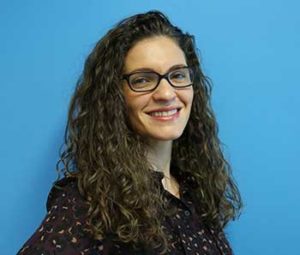5 Best Practices of a Robust Mentorship Program
June 19, 2017
 Jessica Moseley is an EO member in Washington, D.C., and CEO of TCS Interpreting, providing world-class language access to the deaf community. The agency has developed a robust internship and mentorship program. Jessica shared best practices for developing such a program.
Jessica Moseley is an EO member in Washington, D.C., and CEO of TCS Interpreting, providing world-class language access to the deaf community. The agency has developed a robust internship and mentorship program. Jessica shared best practices for developing such a program.
Internships provide practical business experience as a student or other novice narrows the scope of their chosen profession. Mentorships, on the other hand, usually occur after a beginner has entered a specific field, pairing an inexperienced person with a senior sponsor who can impart wisdom and guidance to enhance their future success.
TCS Interpreting has developed a well-rounded internship and mentoring program that reflects its core values of growth and collaboration. Our mentoring program has been influenced by the Vygotskian approach, which holds that adult learners require control and autonomy. Our interns learn in a teacher-scaffold scenario to enable participants to gain a comprehensive understanding as we help to develop their skills by asking questions that lead to self-reflection and self-discovery.
Our interns learn in a teacher-scaffold scenario to enable participants to gain a comprehensive understanding as we help to develop their skills by asking questions that lead to self-reflection and self-discovery.
Our program hosts cohorts in four-month stints year-round at three different levels, each providing support and development at various stages of interpreter development as follows:
Internship Track. Designed specifically for students who need “shadowing” or “observation” hours, this unpaid agreement typically lasts from a few weeks to a few months. The intern observes nationally certified interpreters in a variety of settings.
Residency Track. Designed for interpretation students and novice interpreters, this unpaid agreement can become paid once the resident achieves the skill level necessary to interpret a billable assignment. The resident observes and interprets with nationally certified interpreters in a variety of settings.
Fellowship Track. Designed for novice, post-graduate working interpreters with one to three years of experience, this is a paid agreement in which the interpreter becomes a part-time or full-time employee of the agency. The fellow will interpret alone or in teams with experienced interpreters in a variety of settings.
We also host high school summer interns who help with rudimentary office tasks while improving their American Sign Language skills. They gain valuable work experience and have been some of our most enthusiastic employees.
Our staff interpreters comprise our mentoring team, affording them the opportunity to act in a leadership role. Our mentoring program has afforded staff the opportunity to act in a leadership role and has encouraged greater participation in our programs, supporting our value of collaboration and motivating our mentors to improve their own work through personal skill development. All mentors complete our required minimum 16 hours of mentoring continuing education units (CEUs). Our program is headed by the director of Training and Development, Heather Turell.
Our staff interpreters comprise our mentoring team, affording them the opportunity to act in a leadership role.
We’ve found the following practices extremely helpful in developing our program.
- Sign contracts. Each participant in the mentoring program, regardless of the track, develops and signs a contract with their mentor, to establish clear expectations for both roles and ensure a goal-driven experience. We have high expectations and standards for our mentees, and when they get it right we provide positive feedback to encourage repeated behavior. When our mentees are not on track, we revisit the contract to review and reestablish expectations.
- Foster communication. One of the program’s most successful components is our weekly wrap-up meetings, when the mentoring cohort and one of the mentors meet for training and a healthy discussion about the mentees’ experiences. As mentees discuss successes and challenges, the mentor focuses on the ethical implications of each mentee’s actions and the demands and controls from each scenario. To keep communication lines open, mentors are encouraged to share their ideas for the internship program and to journal about the experience to ensure 360-degree feedback.
- Provide feedback. At the completion of each cohort, the director of Training and Development compiles a list of successes, challenges and feedback provided by both mentors and mentees. One result of this feedback is the “do’s and don’ts list, which is provided to each new cohort. While this is adult-led learning and we want interns to self-select goals, we still may assign them jobs for which they may not grasp the benefit. On our do’s and don’ts list, interns ask questions about how and why these specific assignments aid in their development, but they are not allowed to ask to be removed from the assignment.
- Clarify expectations. To avoid situations where interns are merely completing a set number of hours, we clarify in the beginning that the hours required by their educational institution is just the minimum, and they are expected to complete all hours scheduled during our program. Setting clear expectations is a key to our program’s success.
- Never stop improving. We use a variety of books to help align our program with current mentoring practices, and find the following books helpful for any mentoring program regardless of the type of business: The Mentor’s Guide, The Mentee’s Guide and Creating a Mentoring Culture: The Organization’s Guide by Lois J. Zachary.
Our mentoring program has an enormously positive impact on our company in a variety of ways not limited to employee morale, employee skill development and our bottom line. We find it to be an ideal path for fostering a mindset of life-long learning and shaping highly skilled future employees.
The Entrepreneurs’ Organization (EO) is the only global network exclusively for entrepreneurs. EO helps leading entrepreneurs learn and grow through peer-to-peer learning, once-in-a-lifetime experiences, and connections to experts. Discover the Entrepreneurs’ Organization today!